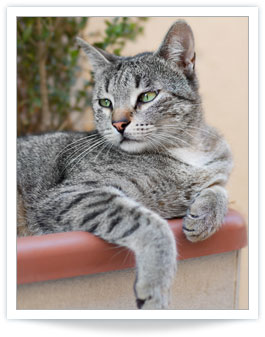Thyro-Cat, LLP
Treatment Options for Feline Hyperthyroidism

There are several treatment options for cats who suffer from feline hyperthyroidism. Each option has both advantages and disadvantages. A comparison of these will help you choose the right remedy for your pet.
Medical Treatment (Tapazole for Hyperthyroidism)
Tapazole (brand name) or Methimazole is a common anti-thryoid medication used to treat feline hyperthyroidism. While it is a highly effective treatment, there are three drawbacks for choosing this for your cat:
- Methimazole must be administered to your cat daily.
- Methimazole must be administered for the rest of your cat's life.
- Side effects are apparent in 15-120% of treated cats, and include: vomiting, loss of appetite, lethargy, potential blood clotting problems and blood cell abnormalities.
Anti-Thyroid Dietary Treatment
The Hill's company has introduced a new diet called Hill's Prescription Diet y/d Feline Thyroid Health. This diet restricts iodine which is necessary for the synthesis of thyroid hormone, and so the thyroid cannot produce excessive amounts of the hormone. While somewhat effective, dietary treatment has a number of drawbacks for treating your cat:
- Very restrictive: can only eat Hill's Prescription Diet, so no treats, no other brands of cat food, and no people food.
Feline Hyperthyroid Surgery
Feline hyperthyroidism surgery is a fairly easy procedure, and removes the thryoid adenoma (the benign tumor responsible for the condition). It's drawbacks are:
- Surgery is expensive.
- Anesthesia required can be difficult to older cats.
RadioIodine Therapy for Cats
Lastly, radioactive iodine therapy is administered by injection and destroys the hyperfunctioning tissue. It is a preferable and sophisticated treatment option for treating your cat's hyperthyroidism. It's drawbacks are minimal when compared with the above treatment options:
- Requires an elongated stay in the feline hyperthyroidism treatment facility.
- Can be expensive.
Despite the time and potential expense, treating your cat with radioiodine therapy has the following advantages over other forms of treatment, which are:
- Only one treatment is needed.
- No anesthesia or surgery is required.
- Almost always results in a cure for life.
What happens if feline hyperthyroidism is untreated? More questions about feline hyperthyroidism and treatment? Learn more about the common treatments for feline hyperthyroidism.